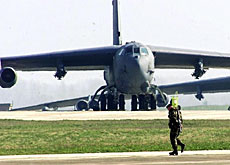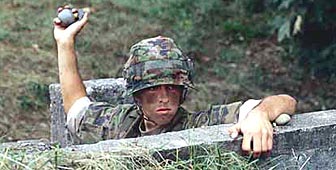Limited ban on arms exports to remain

A key parliamentary committee has backed limited controls on arms sales to countries involved in the war in Iraq, despite political and public calls for an overall ban.
Three political parties and the majority of Swiss say weapons shipments to conflict countries must stop if Switzerland is to remain neutral.
The Social Democrats, Christian Democrats and the Greens had hoped to persuade a foreign affairs committee to ask the government to review its position and take a harder line.
But they were forced to back down due to overwhelming opposition.
Last week, the government reaffirmed its long-standing policy of neutrality and announced it was suspending arms exports to all countries involved in the conflict.
It added that for the duration of the war Switzerland was banning military, surveillance and reconnaissance flights over its airspace by the United States and its coalition partners.
But the government would not commit to a complete ban.
The ban only applied to arms that would be used in the current conflict, and exports by state-owned exporter Ruag and those companies more than 50 per cent-owned by Ruag.
Private manufacturers were allowed to continue arms sales to the United States and Britain if they could prove the material would not be used in Iraq.
Not enough
The Social Democrats, the Christian Democrats and the Greens said the government had not gone far enough.
They protested that to truly maintain its neutral position, Switzerland would have to halt all arms exports to countries involved in the war.
According to a GfS poll published in the “SonntagsBlick” newspaper, around 70 per cent of Swiss support a total ban on arms exports.
However, opponents failed to gather enough support at Tuesday’s foreign affairs committee meeting to bring the matter to a vote.
In the end, parliamentarians retracted their demand and supported the government’s line.
Arms sales
Johann Aeschlimann, parliamentary correspondent at the Bern-based “Bund”, told swissinfo that the government should have adopted a stronger stance on the issue of arms sales.
“The Swiss government has made decisions – based on neutrality – on armaments exports, but they are not as forthcoming or as clear as they could be,” he said.
Béatrice Wertli, spokeswoman for the Christian Democrats, said the party would continue to search for way of achieving a total ban on weapons exports.
“We have two members in government, so we will talk to them directly instead of sending a letter, and will seek a discussion with the government and try to get our position through,” she told swissinfo.
Guarantees
Supporters of a total ban have also questioned the Swiss authorities’ ability to police weapons exports and guarantee that they are not used by warring nations in Iraq.
The State Secretariat for Economic Affairs (Seco) said that it would insist on reports from exporters in order to monitor where the weapons ended up.
Officials said they would be scrutinising Swiss exports of hand grenades to Britain – still permitted under the limited ban – particularly closely.
Recently, a SFr19 million shipment of hand grenades was sold to Britain by the state-owned arms manufacturer, Ruag. Seco said it was too late to find out whether this batch would be used in Iraq.
A shipment of parts for F/A-18 fighter jets to the United States, which falls outside the remit of the ban, has caused concern among human rights groups.
In a statement released on Tuesday, Amnesty International appealed for all Swiss arms exports to be stopped, particularly the F/A-18 deal.
It claimed that Switzerland had no way of guaranteeing that the parts would not be used in the Iraq conflict.
Economic interests
The government’s reluctance to enforce a complete ban on weapons exports may have been influenced by fears that the Swiss economy, already weakened by the global downturn, would be further damaged by a cessation of overseas arms sales.
In 2002, the United States and Britain bought Swiss weapons amounting to SFr30.8 million and SFr18.2 million respectively.
This is a view supported by Radical parliamentarian Claude Frey, who says an overall ban on weapons exports to such important customers would not be in Switzerland’s best interests.
“To cut off ties [with the United States] would be to shoot ourselves in the foot,” he said. “We have a lot to lose and nothing to gain.”
But those calling for a complete ban on sales to these countries argue that moral issues should prevail over economic demands.
“I think Switzerland can afford not to export arms to the countries taking place in the conflict,” said Wertli.
swissinfo, Joanne Shields
The Social Democrats, Christian Democrats and the Greens have failed to persuade a foreign affairs committee to ask the government to ban all arms exports to countries involved in the war in Iraq.
The government has only banned the sale of arms destined to be used in the conflict in Iraq and on those sold by private firms.
Some 70 per cent of the Swiss public also want a total ban on arms exports to countries involved in the war for the duration of the conflict.
In 2002, the United States and Britain bought Swiss weapons amounting to SFr30.8 million and SFr18.2 million respectively.
Critics of the government’s stance say there is no way of ensuring that arms shipped to the United States, Britain and Iraq will not be used in the current conflict.

In compliance with the JTI standards
More: SWI swissinfo.ch certified by the Journalism Trust Initiative











You can find an overview of ongoing debates with our journalists here . Please join us!
If you want to start a conversation about a topic raised in this article or want to report factual errors, email us at english@swissinfo.ch.